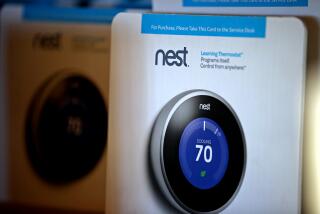Rewarded for the exchange
- Share via
Attention, online shoppers!
You can get cash rebates or free merchandise just for doing the shopping you’re probably already doing on the Internet. Brand-name merchants such as Gap, Apple, Target, Office Depot and hundreds of others are involved.
All you have to do is shop them using one of several rebate sites on the Web.
It may be a long time before you reap enough rewards to earn even a toaster. And you have to be willing to give up some privacy.
That’s OK with Christine Sudicky, an administrative assistant in Chicago who makes most of her online purchases through the one of the most popular reward websites, Ebates.com.
“I go online, make a purchase and then without really paying attention a rebate automatically gets added to my account,” said Sudicky, who recently moved into a new house.
The website generally kicks back to the shopper 1% to 4% of the retail price charged by its biggest merchants. Sudicky’s purchases of furniture and other items have been enough over the last seven months to earn her $300 in rebates.
If you aren’t trying to fill an empty house -- or aren’t the personal shopper for Paris Hilton -- the rewards will be far smaller.
Let’s say you buy a $1,000 computer from Dell, which earns an Ebates rebate of 2%.
So now you have $20 coming. But to get the money you have to wait anywhere from about seven weeks to six months.
That’s because Ebates automatically holds on to rebates for 45 days as a hedge against the shopper’s returning the item for a refund. And because the rebate checks are sent out quarterly, unfortunate timing can extend the wait.
Ebates, like most reward websites, is set up as a portal to the wide world of shopping. You go to Ebates first and then click on a link to one of the more than 800 merchant sites listed.
If you make a purchase, Ebates gets a commission, part of which is passed to the shopper.
MyPoints.com gives points to its shoppers, which they can redeem for gift cards. Buy a hammer online at Ace Hardware or an outfit at Saks Fifth Avenue and you get two points per dollar spent. Shopping at Hewlett-Packard reaps three points per dollar; At Barnes & Noble, you get 10.
But again, if you’re not on a shopping spree, the real-world rewards will not be major.
If you spend $1,250 for a Hewlett-Packard laptop at that company’s website, you would receive 3,750 points, which is enough to obtain a Target gift card worth $25.
That will get you a toaster -- but not a fancy one.
Then there’s the privacy issue. The reward sites are fertile ground for learning about a shopper’s interests because they can track activity at not only one site, but a bunch of them.
“This is the kind of information,” said Beau Brendler of the nonprofit Consumers Union’s Consumer Reports WebWatch, “that can help put together a personal shopping profile of you.”
MyPoints ups the ante by presenting subscribers with questionnaires about income, car, hobbies, health, occupation, shopping habits and other topics.
But why would anyone give out that information? Points. The more questions you answer, the more points are added to your account.
“That consumer might get some targeted spam,” said Andrew Frank, an analyst with Gartner Research, “although a company might use the nice term, ‘relevant offer.’ ”
Ebates uses the information it gathers to send subscribers targeted e-mails. But Chief Executive Alessandro Isolani said the data didn’t leave the company.
“We never share the subscriber information with anyone else,” he said. “We never sell it.”
The privacy rules concerning personal information at MyPoints aren’t clear, Consumers Union’s Brendler said. MyPoints’ policy, as posted on the site, says information shared with other companies about subscribers “is in aggregate form and is designed to ensure you are not identified personally.”
But the next sentence says MyPoints “may provide certain of your personal information to specific advertisers to allow them to provide information about the offer or service to you.”
Brendler said that was ambiguous, at best.
“We are in the business of looking at this kind of information,” he said, “and we can’t really figure out what it says.”
MyPoints didn’t respond to requests for interviews.
Most shoppers who use reward portals aren’t too worried about personal information privacy, said e-commerce analyst Lauren Freedman, who included reward sites in a study on Web merchandising last year.
Freedman said she liked the idea of reward site Upromise.com, which deposits its rebates in tax-deferred higher education accounts.
But even the biggest reward sites haven’t caught on in a major way. In March, MyPoints had nearly 4 million visitors and Ebates had just over 1 million, according to tracking service Nielsen/NetRatings. Those are pittances when compared with major players such as Amazon.com, which had 42 million that same month.
What’s holding back reward sites is the simple fact that using them adds steps to the shopping process, Freedman said.
“It’s about time and commitment,” she said. “Is it worth the trouble to get 2% or 3% back?”
Even the prospect of cold cash can’t sway us.
“When it comes to shopping,” Freedman said, “I don’t think we have the mental bandwidth to deal with yet another thing.”
*
(BEGIN TEXT OF INFOBOX)
Online payback
Reward websites that offer cash or redeemable points for online purchases aren’t as well known as some of the e-commerce venues they link to. Still, there are millions of shoppers taking advantage of the sites. These figures are for March.
MyPoints.com 4.7 million
Upromise.com 2 million
Ebates.com 1.3 million
FatWallet.com 0.7 million
--
Source: Nielsen/NetRatings
More to Read
Inside the business of entertainment
The Wide Shot brings you news, analysis and insights on everything from streaming wars to production — and what it all means for the future.
You may occasionally receive promotional content from the Los Angeles Times.











